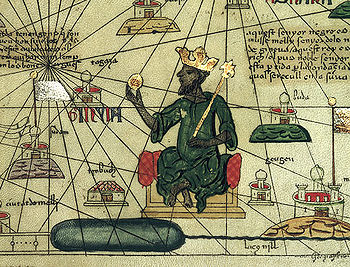 |
| Mansa Musa |
Much of African history was preserved by a oral rather than written tradition. Writing is one of the markers of civilization. People who don't use writing aren't civilized. In 1324iiish Mansa Musa made the Haji. At the time of Mansa Musa's rise to the throne, the Malian Empire consisted of territory formerly belonging to the Ghana Empire and Melle (Mali) and immediate surrounding areas, and Musa held many titles, including Emir of Melle, Lord of the Mines of Wangara, and conqueror of Ghanata, Futa-Jallon, and at least another dozen states. He was the wealthiest ruler of his day and one of the wealthiest people of all time. Musa was referred to and is most commonly found as Mansa Musa in Western manuscripts and literature. His name also appears as Kankou Musa, Kankan Musa or Kanku Musa which means "Musa, son of Kankou", where Kankou is the name of his mother. Other alternatives go on as Mali-koy Kankan Musa, Gonga Musa and the Lion of Mali. Mansa Musa was filthy rich. We don't have many written records about Africa because they were uncivilized. Mansa Musa knew all about the places he was going to before he even got there. They traded salt and gold might sound like a bad idea but without salt you die. The first converts were traders. Musa was a devout Muslim and his pilgrimage to Mecca, a command ordained by Allah according to core teachings of Islam, made him well-known across northern Africa and the Middle East. To Musa, Islam was the foundation of the "cultured world of the Eastern Mediterranean". He would spend much time fostering the growth of Islam in his empire. Musa made his pilgrimage in 1324, his procession reported to include 60,000 men, 12,000 slaves who all carried 4-lb. gold bars, heralds dressed in silks who bore gold staffs, organized horses and handled bags. Musa provided all necessities for the procession, feeding the entire company of men and animals. Mansa Musa gave away lots of his riches. Mansa Musa was Muslim and relatively devout. Muslim kings were trying to extend their power to many non Muslim populations. Ghana empire was probably the first empire in west Africa. All that is known about Ibn Battuta's life comes from the autobiographical information included in the account of his travels. Ibn Battuta was born into a Berber family of Islamic legal scholars in Tangier, Morocco, on 25 February 1304, during the reign of the Marinid dynasty. As a young man he would have studied at a Sunni Maliki madh'hab, (Islamic jurisprudence school), the dominant form of education in North Africa at that time. For safety, Ibn Battuta usually joined a caravan to reduce the risk of an attack by wandering Arab Bedouin. He took a bride in the town of Sfax, the first in a series of marriages that would feature in his travels. Mansa Musa spent so much money that he caused run away inflation. On 17 November 1326, following a month spent in Mecca, Ibn Battuta joined a large caravan of pilgrims returning to Iraq across the Arabian Peninsula. The group headed north to Medina and then, travelling at night, turned northeast across the Najd plateau to Najaf, on a journey that lasted about two weeks. In Najaf he visited the mausoleum of Ali ibn Abi Talib (Ali), the 4th caliph and the son-in-law of the prophet Muhammad. Then, instead of continuing on to Baghdad with the caravan, Ibn Battuta started a six-month detour that took him into Persia. From Najaf he journeyed to Wasit then followed the river Tigris south to Basra. His next destination was the town of Esfahān across the Zagros Mountains in Persia. He then headed south to Shiraz, a large, flourishing city spared the destruction wrought by Mongol invaders on many more northerly towns. Finally, he returned across the mountains to Baghdad, arriving there in June 1327. We know so much about Mali is because it was visited by Ibn Battuta. Ibn Battuta was probably the most well traveled person until the invention of the steam engine. Every where Ibn Battuta went he was treated like a king. Ibn Battuta recorded his visit to the Kilwa Sultanate in 1330, and commented favorably on the humility and religion of its ruler, Sultan al-Hasan ibn Sulaiman, a descendant of the legendary Ali ibn al-Hassan Shirazi. He further wrote that the authority of the Sultan extended from Malindi in the north to Inhambane in the south and was particularly impressed by the planning of the city, believing it to be the reason for Kilwa's success along the coast. From this period date the construction of the Palace of Husuni Kubwa and a significant extension to the Great Mosque of Kilwa, which was made of Coral Stones and the largest Mosque of its kind. With a change in the monsoon winds, Ibn Battuta sailed back to Arabia, first to Oman and the Strait of Hormuz then on to Mecca for the hajj of 1330 (or 1332).


No comments:
Post a Comment